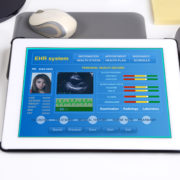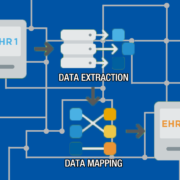4 Ways Orthopedic Practices Benefit from a Specialty EHR System
The healthcare industry has lagged behind others when it comes to adopting, integrating and implementing technology. The adoption of electronic health records (EHR) only came about because of government incentives aimed at physicians, including those in orthopedics, were offered. This same approach — along with penalties — is the impetus behind interoperability. It’s not that the healthcare industry hasn’t been on board with taking advantage of all that technology has to offer. Previously, both the industry as a whole and individual orthopedic practices have faced challenges in integration and interoperability. A specialty EHR system addresses both issues with specific features for orthopedic practices while offering the following benefits:
1. Improved Workflow
Using multiple systems to handle billing, practice management, EHR and the other necessary tasks disrupts workflow, making it difficult to maintain a cohesive and responsive environment for both members of the practice and patients. Using paper, phones, fax and other systems to complete the day-to-day running of an orthopedic practice leads to inefficiencies. Moving these functions over to one technology-based system improves a practice’s workflow.
2. Streamlines the IT Environment
Many orthopedic practices have a mixture of software fueled by multiple systems — both those that are on-site and that exist in the cloud. These are combined with systems that rely on paper files to deliver a complicated environment of record keeping. The addition of other technology-based systems that are designed to focus on the coordination of care and increase reimbursement further complicates the issue. Using a specialized EHR with features geared solely for orthopedic practices streamlines the entire IT environment by keeping all functions within one flexible system.
3. Increase Convenience and Security
All team members within an orthopedic practice are likely to have several different login credentials tailored to each system that’s in place. Not only is this inconvenient when it comes to logging in each time, it can decrease security when the same login information is used across different systems. Some departments might have access to information that they don’t need to do their jobs, putting the entire practice at risk for noncompliance. A specialty EHR system provides the ability to customize credentials to suit a particular person’s job while making it necessary to remember only one login.
4. Save Money
A specialized EHR system saves a practice money in several ways. The reduction in office supplies, paper, mailing and printing expenses is likely to be noticed almost immediately once such as system is implemented. Because a specialty EHR system increases the accuracy of charges and coding, payment turnaround will be significantly faster. Payments will also be quicker because invoices are sent electronically, eliminating post office delays and other circumstances beyond a practice’s control.
Choosing the right EHR system is crucial to the smooth implementation of this new technology. Exscribe is the first such system solely focused on the specialized needs experienced by orthopedic practices. In just 30 minutes, you’ll seen the power and performance of Exscribe in action when you sign up for a free demo of the system.











